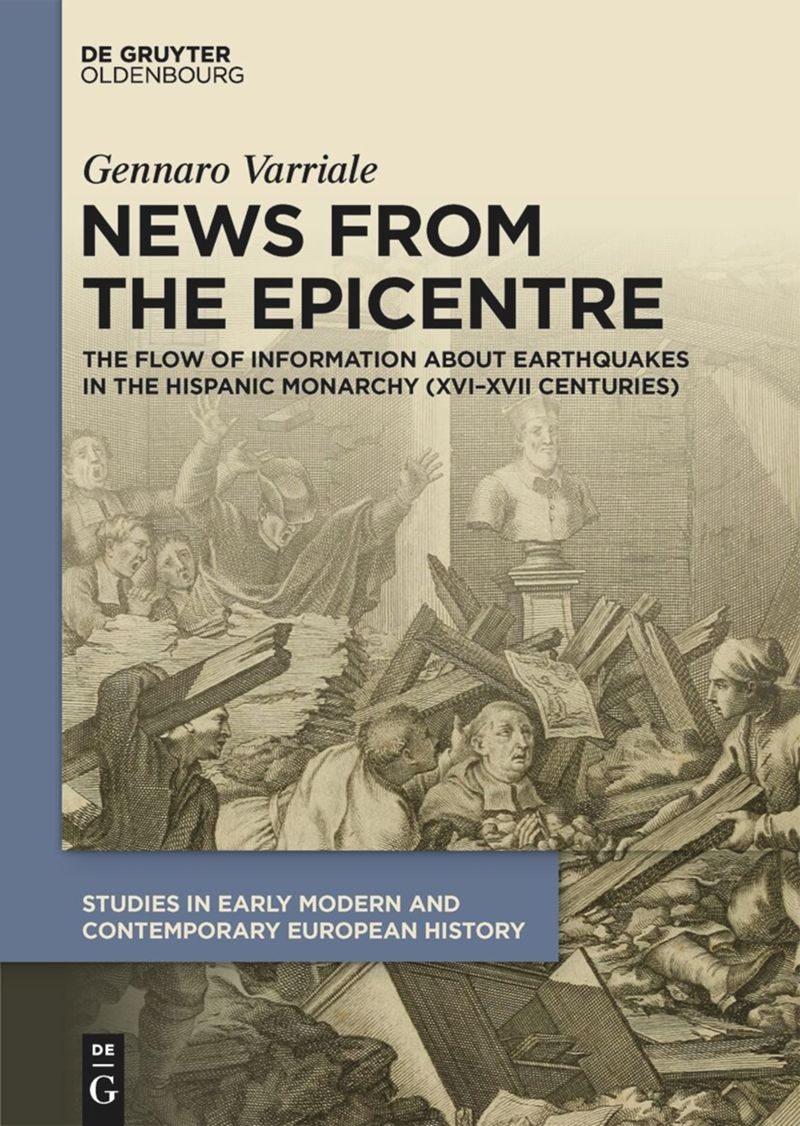News from the Epicentre
The Flow of Information about Earthquakes in the Hispanic Monarchy (XVI–XVII Centuries)
Gennaro Varriale

Numero: 7
Editore: De Gruyter Oldenbourg
Città: Berlin/Boston
Anno: 2025
Pagine: 218
Cartaceo
E-book
| ISBN: | e-ISBN (PDF) 978-3-11-145480-1 e-ISBN (EPUB) 978-3-11-145520-4 |
Libro
For decades historians argued for the downfall of communication, when early modern societies were hit by a natural disaster. After all, earthquakes caused the destruction of infrastructure, which hindered the spread of news. Instead, the last investigations opened a new point of view about the political communication: every crisis was a catalyst for news. The book widens this reading through a comparative analysis of several earthquakes in the Hispanic Monarchy territories, from Asia to America.
However, the examination of communications provided in this volume is not an end in itself but is offered as a basis for reflection and to propose the notion that earthquakes trigger change in social and political dynamics. Earthquake-related crises exposed the underlying contradictions that the court of Madrid needed to address in the most effective way, and, if possible, swiftly.
Earthquakes not only destroyed buildings and infrastructure but also social norms. Urgency reduced the distance between interlocutors, to some extent blurring the boundaries of self-censorship. Tremors therefore offer a rare opportunity to observe the political and military crises faced by the Hispanic Monarchy, the global empire of the time.
Indice
Abbreviations
Introduction
1 Background
2 Communications in the Hispanic Monarchy
3 Structure of the Book
4 Acknowledgements
Chapter 1 Monte Nuovo 1538: the Epistemology of the Disaster
1 Ominous Signs
2 First-hand Accounts
3 Describing the Disaster
Chapter 2 Fissures at Sixteenth-century Frontiers
1 Ambassadors: Respectable Spies
2 Cracks in the African Fortresses
3 The Remotest Parts of the New World
Chapter 3 Seventeenth-century Calabria: a Topsy-turvy World
1 The Voices of the Survivors
2 Improving the Flow of Information to Madrid
3 Assessing the Damage
4 The Day After: Prophecies, Corsairs and Trench Monkeys
5 Who Decides: Naples or Madrid?
Chapter 4 The Philippines: a Remote and Unfamiliar Land
1 The Long and Winding Road
2 Holy Mass in a Straw Hut
3 Tremors, Trepidation and Trade
Chapter 5 Ragusa 1667: a Young Queen’s Humanitarian Aid Strategy
1 Bad News from the Adriatic
2 A Vulnerable Bastion
3 The Pear is not yet Ripe
4 The Politics of Aid
5 Maintaining the Status Quo
Chapter 6 Lima 1687: the War of the Melchiors
1 The Viceroy and the Archbishop
2 The Late News… the Very Late News
3 Sermons, Slander and Gossip
4 One Hand, Two Daggers
Chapter 7 Naples 1688: Death, Destruction and Games of Chance
1 Destruction on the Slopes of Mount Vesuvius
2 Mala Tempora Currant… Summer in Madrid
3 Sinful Games of Chance
4 The Aftermath of a Lottery
Chapter 8 Sicily 1693: Trinacria Disfigured
1 God Helps Those who Help Themselves
2 A Resourceful Viceroy
3 The Menace from the Sea
4 Heaven Help Us
Conclusion
Bibliography
Index of names
Index of places
Parole chiave
- Early Modern and Modern History
- Hispanic Monarchy
- Disaster Studies
- Earthquakes

